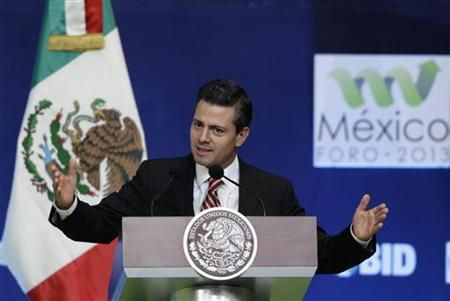
(Reuters) - Mexican President Enrique Peña Nieto launched a campaign against hunger on Monday, pledging to transform the lives of nearly 7.5 million of the country's poorest, though he gave few details, prompting criticism that the plan was a "rehash" of old policies.
Tackling the poverty that blights Mexico has been a priority for many presidents of Latin America's second-biggest economy, and it was one of the first pledges Pena Nieto made when he launched his election campaign at the end of March.
The 46-year-old president outlined a four-point plan to tackle hunger in 400 of Mexico's roughly 2,500 municipalities, urging community action, local government responsibility and pledging to strengthen agricultural production in afflicted areas.
However, he did not detail the cost of the plan.
"It's painful and saddening that there are still Mexicans suffering with hunger here in Chiapas, and, it has to be said, in every corner of Mexico," said Pena Nieto, who took office on December 1.
"This is not a handout program; it's not just about giving out food to those that need it," he added.
Pena Nieto was speaking in Las Margaritas in the poor southern state of Chiapas, a town that was a hotbed of resistance to the federal government in the 1990s.
Las Margaritas was also a stronghold of the Zapatistas, a leftist revolutionary movement that rose up against the government in 1994, partly in protest against Mexico's signing of the North American Free Trade Agreement (NAFTA) with the United States and Canada.
Pena Nieto has won praise for pushing hard on a variety of reforms since taking office, but analysts were not convinced on Monday, saying the anti-hunger plan was vague and seemed much like existing policies.
"I would say it's a disappointment because it's very thin on details," said Susan Parker, an economist at Mexico City's CIDE university, adding that it failed to address what would happen to older poverty-fighting programs.
"It's a rehash," said Jorge Villasenor, an economist at the University of Guadalajara. "He's just dusted off policies that have been around since the mid-90s."
Pena Nieto pushed the 2013 budget through Congress barely a week after taking office and gained broad support for a landmark education bill, having convinced political rivals to sign a pact to work with him on a wide-reaching reform agenda.
Former President Felipe Calderon presided over a sharp rise in poverty, and nearly 60 million Mexicans - or around half the population - are now considered poor. That is roughly the same percentage as in the 1980s.
Pena Nieto has praised former Brazilian President Luiz Inacio Lula da Silva's successful social policies, which lifted around 20 million people out of poverty between 2003 and 2009.
(Additional reporting and writing by Gabriel Stargardter. Editing by Christopher Wilson)
© Thomson Reuters.




